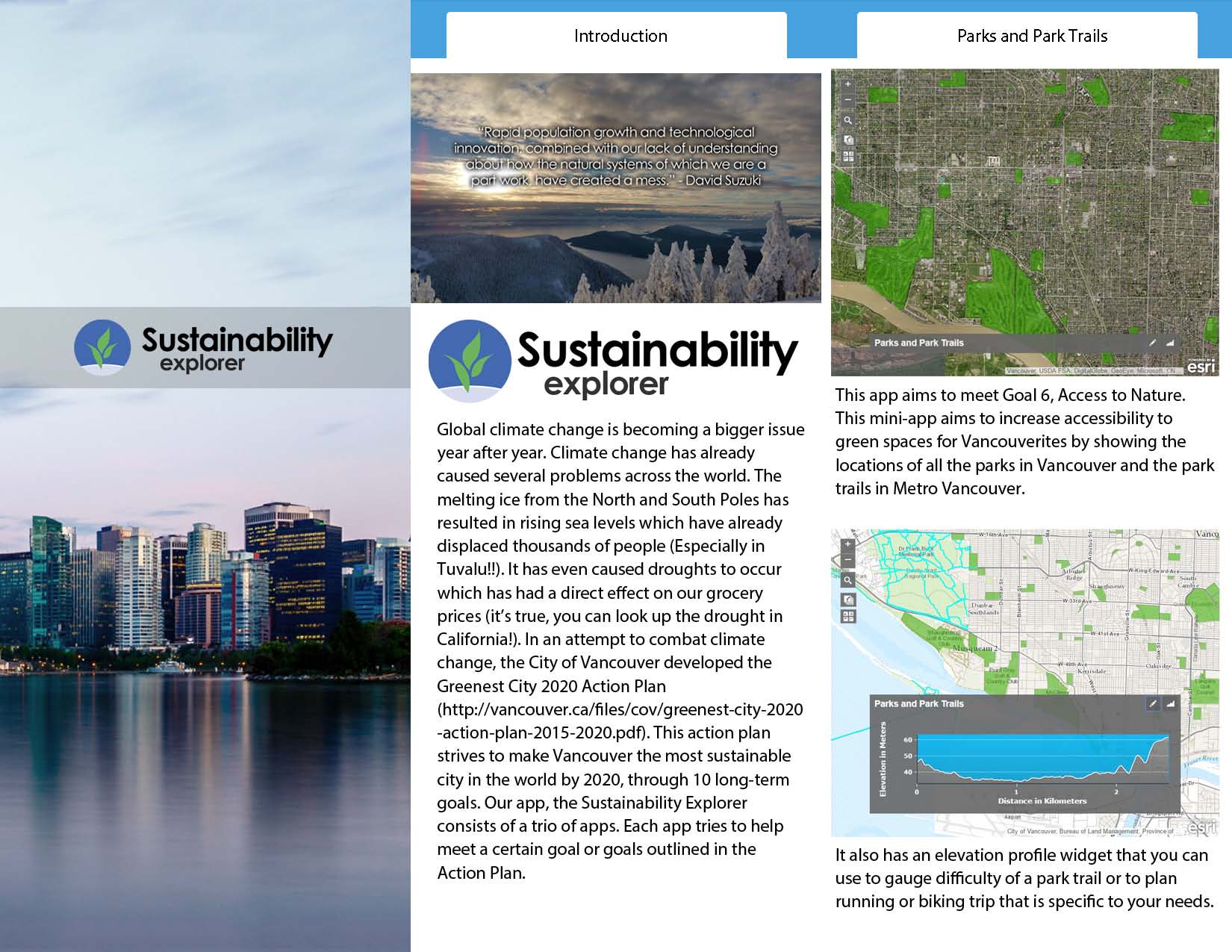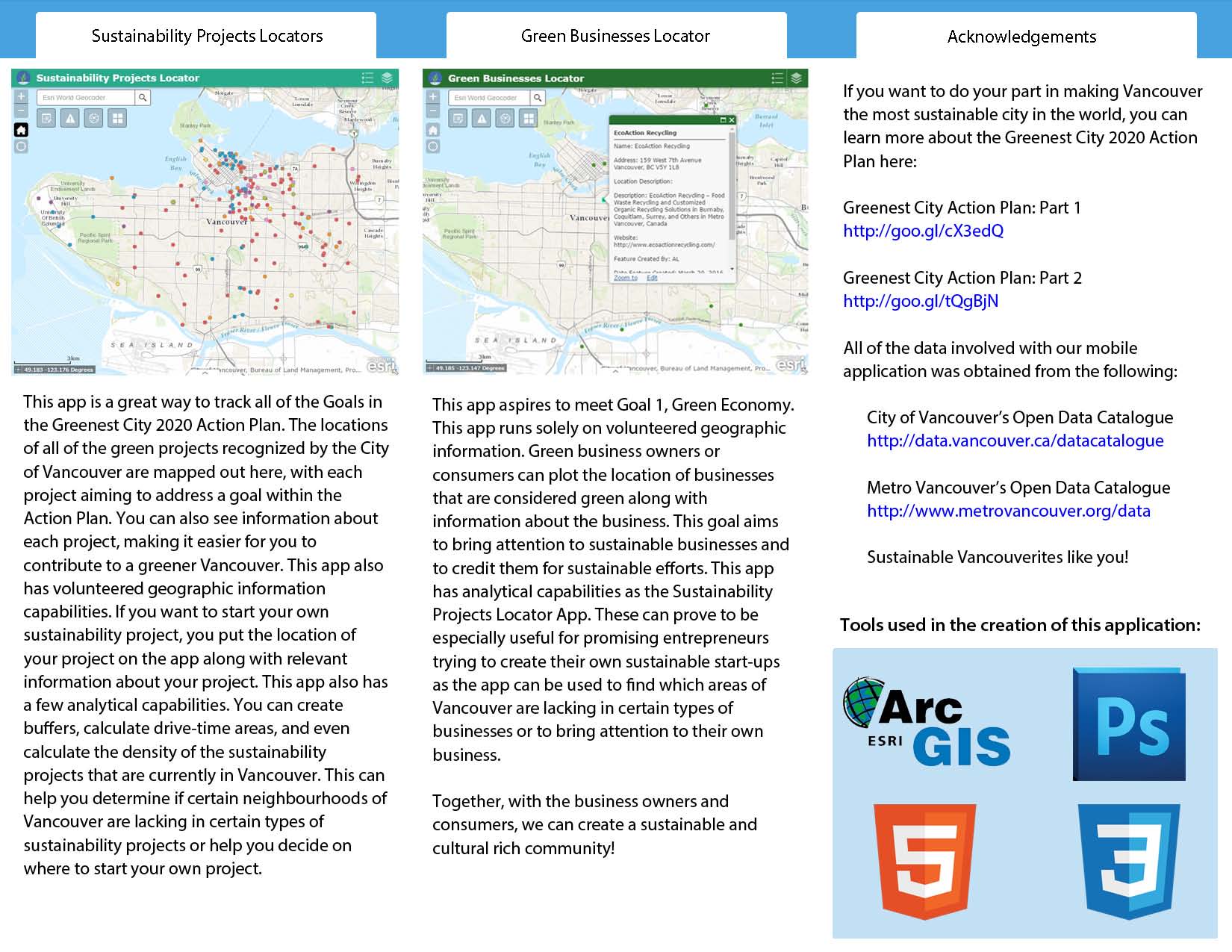Linking App-Building and Cartography – Experiences from the 2016 Esri Canada App Challenge
Hi Everyone,
Congratulations to the winners and participants of the 2017 Esri Canada App Challenge! With the recent conclusion of the 2017 Esri Canada App Challenge, I’ve decided to write about my overall positive experiences with the 2016 Esri Canada App Challenge. Some of the students in my multimedia cartography (GEOG 351) class participated in the App Challenge. To quote Esri Canada, the objective of the App Challenge is to “challenge students to use their technical GIS knowledge, creativity, and ability to innovate and work together to produce a relevant and functional app using the Esri platform.” The App Challenge is much similar to a hackathon, where groups of contestants collaboratively work on software projects. In this case, the goal is to create an app to address a certain theme using open data and Esri software.
In our multimedia cartography (GEOG 351) class, cartography foundation principles for both digital and non-digital media were presented. We learned about the principles of map design and analysis for both static and dynamic maps (i.e. web maps). We created web maps using ArcGIS Online and then started to make basic web apps with Esri’s Web AppBuilder for ArcGIS. This evolved into creating increasingly sophisticated web apps. At a time when maps are increasingly being used to communicate data and information, it is ironic that dedicated cartography courses are not offered more frequently in the GIS curriculum. In my case, I am pleased to have taken this Multimedia Cartography course and to have been able to apply those important skills to a competitive project through the Esri Canada App Challenge. In 2016, App Challenge themes were the following:
- Sustainable Communities/Cities
- Climate Change
We had one full week (exactly 168 hours) to work on our web apps. Apps created for the challenge had to be centered around at least one of the previously mentioned themes. Participants were typically students from one of Esri Canada’s seven designated Centres of Excellence (ECCE). As such, participants could seek technical support from faculty and staff members at their respective ECCE institutions. In addition, participants could also contact Esri Canada’s higher education staff for technical support as well. Lastly, Esri Canada published a website with information about the App Challenge and a series of videos to help participants get started.
My group (which consisted of myself and two other undergraduate students) ended up making a web app called the Sustainability Explorer. It consisted of three mini-apps within it that attempted to promote the City of Vancouver’s Greenest City Action Plan. Our app was created using a temporary ArcGIS Online account so our app is no longer technically “on the web” but we created a brochure (see Figures 1 and 2) that provides more descriptive information. To make our submission for the App Challenge, we had to submit the coding of our app onto Github. We also had to create a video that demonstrated how our app was used and needed to type up a mission statement which described what our app was trying to achieve. These activities added to my GIS skills set.
In all honesty, the week we had to work on our submission was informative and went by very quickly. There was so much to learn and do in a limited amount of time but it taught me how to work within a team and manage time effectively. The most challenging aspect was the specification of the problem to be solved and to translate it into a GIS solution based on web apps. Overall, I felt that participating in the App Challenge, although challenging at times, was very rewarding. It helped me build related professional expertise and skills in the discipline of GIS. It also taught me how to efficiently work with ArcGIS Online & Esri’s Web AppBuilder for ArcGIS. This proved to be extremely useful with one of my future co-op practicums (where I had to work with ArcGIS Online to use Collector for ArcGIS to conduct field work). Hopefully, this short summary about my experiences with the App Challenge will inspire some of you to participate in future App Challenges!
Figure 1. Brochure of the Sustainability Explorer (Front).
Figure 2. Brochure of the Sustainability Explorer (Back).


